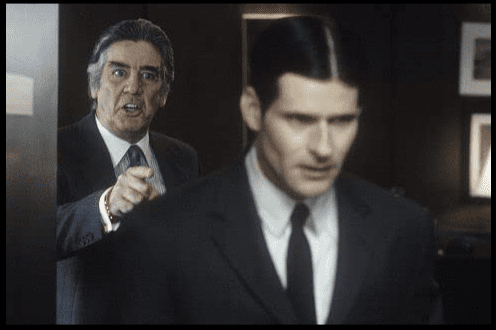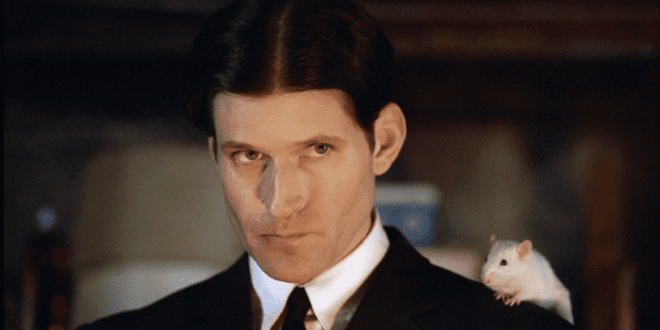Unfortunately, Glen Morgan’s Willard seems a bit underrated. Then again, that surely fits the theme and overall feel of the story itself. Willard Stiles (Crispin Glover) is constantly mocked and humiliated by his life at home, and at work. Made into a misfit and the butt of life’s joke, Willard’s main companions are the rats in his basement. What a life!
To be fair, plenty of people do have pet rats, but not every rat owner shares a special connection with the rodents that Willard has. This film asks that important question: What if rats could be loyal to one’s commands, possibly even enacting revenge against those who’ve wronged us and who grind us down? As we see Willard get pushed around, bullied, and shamed, do we not share in his delight when he finally gains the upper hand? At the same time, Willard also reminds us that, should we bite the hand that feeds, we can always expect to get bit right back.
Do the Rats in “Willard” Symbolize Anything?
There’s always a danger of overanalyzing a movie, but Willard is just deep enough that it pays to think about what Willard’s rats symbolize. Obviously, rats (and mice) scare some people or gross them out. Some people have phobias of them, and many of us just view them as pests. In fact, even Willard himself doesn’t realize his potential affinity to rats at first, reflecting sort of a conventional understanding that they are merely a problem to get rid of.
However, at his core, Willard strives to be a kind and caring sort. When his domineering mother, Henrietta (Jackie Burroughs: Heavy Metal 1981) tasks him with exterminating rats in their basement, Willard opts for non-kill traps. That’s how he first meets Socrates, a rat who ends up being his only true pal after Willard frees him rather than tossing him out. Basically, Willard sees to see himself in Socrates, offering the rat some of the courtesy and companionship lacking in his own life. After all, if Willard throws him out, is he really any better than those who would toss him out, and never give him a fair chance?
So, Willard represents sort of a different path. We can see rats as creatures that inadvertently contaminate humans with the plague. Willard, however, fails to see how his “rat problem” would be any worse than his people problem – best symbolized by his boss, Frank Martin (R. Lee Ermey). In contrast to rats which unwittingly spread disease, Martin intentionally spreads negativity to all of his underlings and acquaintances, making Willard’s life itself seem like some tragic, pathetic disease, and ultimately driving him mad. Basically, it’s like the bats in Willard’s belfry meet up with the rats in his basement and cook up a sinister (albeit understandable) revenge plot.
Willard’s Shame… And Newfound Power

People “snap” quite often in the United States, for one reason or another, and often enough they end up targeting people who are relatively innocent. Willard’s strange approach is much more calculated and is a classic, specific revenge scenario. With his power over rats, there is seemingly even a chance he could get away with it. After all, it’s believable if someone threatens to shoot up a workplace, but to send a pack of rats? Who would believe such a thing?!
Meanwhile, Willard’s well-meaning-yet-abusive mother ends up kicking the bucket, and Willard’s anger and resentment boil over to the point of no safety. Toward the end, Willard tries to stop the rats himself, realizing they are increasingly out of his control, with the large rat, Ben, being too independent. On that note, it’s as if Ben represents Willard’s collision with himself and his own actions, which kills any semblance he had of a normal life.
Unrequited Love?
As the story builds, Willard’s co-worker, Cathryn (Laura Elena Harring: Mulholland Drive 2001), becomes a little more prominent as someone who sympathizes with Willard. Outraged by much of what she sees, Cathryn nevertheless falls short of empowering Willard in a more positive way. It’s debatable to what extent Cathryn might have been interested in a deeper relationship with Willard, but it’s entirely plausible she merely represents a fleeting conscientious presence and a glimpse of what could have been.
Revenge is really what puts Willard in the proverbial driver’s seat, and the movie ends with Willard finding a new Socrates in his little cell, implying sequel potential. Still, there has yet to be a follow-up to this film, and it’s doubtful we’ll see Mr. Stiles continue his journey. However, in a world where Sharknado had tons of sequels, it’s not too crazy to think this film’s universe could be expanded.
What are your thoughts on Willard? Let us know in the comments!
 PopHorror Let's Get Scared
PopHorror Let's Get Scared




